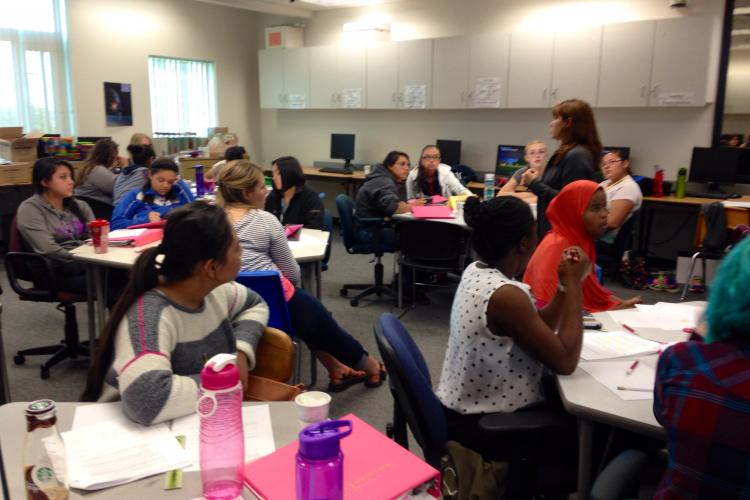Photo Credit: Las Chicas de Matemáticas: UNC Math Camp for Young Women
Hortensia Soto (a.k.a Tensia) attended Chadron State College, the University of Arizona, and the University of Northern Colorado where she earned her PhD in educational mathematics. She is a faculty member at the University of Northern Colorado. Tensia has approximately 50 publications in various areas of mathematics education including assessment, mathematical preparation of elementary teachers, outreach efforts for high school girls, and teaching and learning of undergraduate mathematics. Since her days as an undergraduate student, she has mentored young women and promoted mathematics via summer outreach programs. Tensia is a working member of the Mathematical Association of America and currently serves as the Associate Secretary and as an editor of the MAA Instructional Practices Guide. She is also a Project NExT fellow. Most recently, she received the MAA Deborah and Franklin Tepper Haimo Award for Distinguished College or University Teaching of Mathematics.
What made you pursue a PhD?
One day I was in my undergraduate advisor’s office asking him a question about topology and he said something about me getting a PhD. I asked, “What’s a PhD?” He told me and I said, “Ok, someday.” I trusted my advisor so much and if he said that I should do something then I did it.
What advice do you have for someone looking to get their PhD?
-
Figure out why you want a PhD and what you hope to do with it. For example, if you want a PhD because you want to teach then also take some time to find a mentor who can help you become informed about best teaching practices or take courses that teach you how to teach mathematics.
-
Take time to learn about the university where you hope to go. Make sure that it is a good fit for you based on your undergraduate preparation and personal needs.
-
Learn about the department. For example, if a department claims to value diversity then find evidence that supports this claim.
-
Graduate school is not easy so find a support group with whom to study, to play, to gripe, to celebrate, to cry, and to rejoice.
I know you have worked quite a lot with female students (Las Chicas de Matemáticas: UNC Math Camp for Young Women), why do you think it is important for women to be involved in math?
-
I think it is important that anyone who wants to engage with mathematics to have an opportunity to do so. This allows for diverse thinking, reasoning, conversations, and thus, diverse solutions.
-
For so long, we have perceived mathematics solely as a science, something to be done in isolation and in a competitive manner (think about the historical competitions to find solutions to polynomials). I believe that through mathematics our scientific side can emerge as well as our compassionate side. I believe that mathematics can serve as a vehicle for compassion if we can admit our own struggles in learning mathematics. Remembering and admitting such events might help us to reach, invite, and support everyone who wants to be in the mathematics community. I believe women in mathematics are humble enough to lead these efforts.
Why do you think MAA MathFest should be more diverse?
Editor’s note: In her role as MAA Associate Secretary, Soto plans and manages the scientific program of MAA MathFest.
-
One of the MAA’s core values is inclusivity which entails advocating and celebrating diversity and broadening access to mathematics to diverse audiences.We need role models for our diverse audiences. We all need to see someone who looks, sounds, and acts like us on stage before we can even begin to aspire or to imagine ourselves up there. (I speak from personal experiences when I say this!) MAA has the power and privilege to ensure that it offers such role models and I think they/we are making progress in this area,
-
Most importantly, it is the right thing to do!
As a fellow alumni what would you say is the value of being a part of MAA Project NExT?
MAA Project NExT was professionally life-changing! The list of benefits is so long including making lifelong friends, meeting superstars in the MAA/AMS/ASA circles, and of course advice on how to best teach. Seriously, Project NExT opened doors for me that I didn't even know existed. The value of Project NExT is that I am part of a large network who cares about the teaching and learning of mathematics and I get to share my expertise as a mathematics educator.
As a math educator what do you always try to teach to your students and why?
That mathematics is beautiful because of all the way that it relates ideas. Mathematics is about relationships. Doing mathematics teaches us lessons that we can adopt and adapt as part of life.

